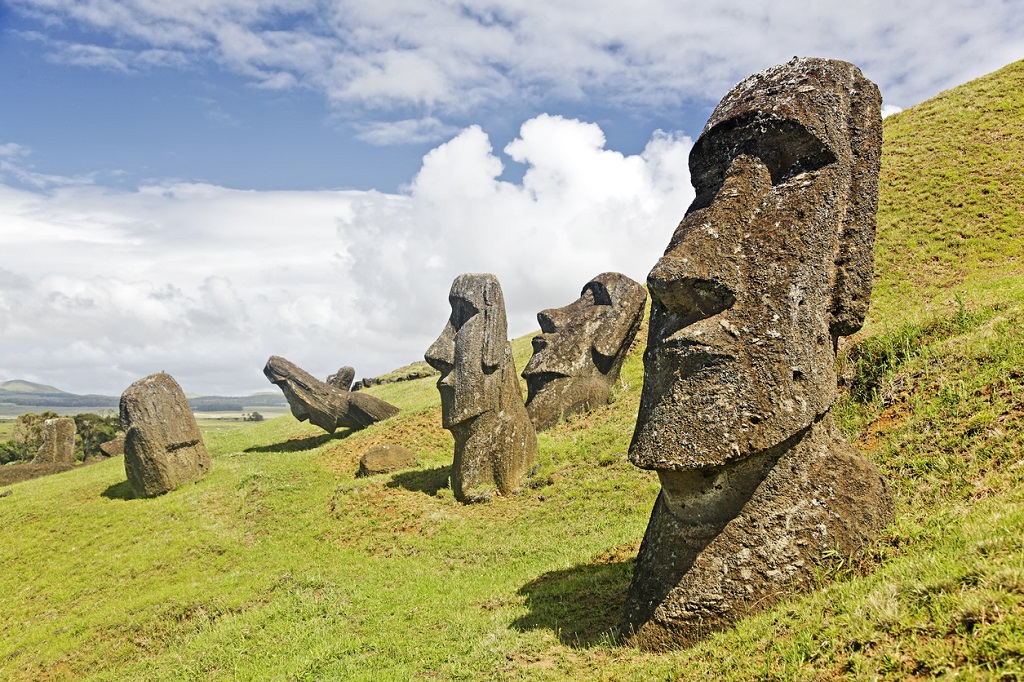Spread over an expanse of 64 square miles, Rapa Nui of Easter Island is one of the world’s most interesting cultural and historical attractions. Home to Polynesians, it is also home to 900 giant stone figures that are centuries old. The island thrives on tourism and has around 100,000 annual visitors, according to ‘The New York Times’. The biggest attraction is the monolithic Easter Island statues called moai. There are no specific answers as to which civilization carved them or how they brought these heavy figures to this location (it’s believed that these ancient moai were originally carved out in huge quarries). It still remains an Easter Island mystery.

How And Who: History
Easter Island was called Rapa Nui by its original residents until Dutch explorers landed there in 1722. The European settlers renamed the island Paaseiland or Easter Island. Because they found very few trees, people theorized that the early inhabitants were trying to move the Easter Island statues to the seashore from quarries. In the late 19th century, it was invaded by Chile. It is believed that the first human residents of this Island arrived in 700-800 AD. The first ruler of Easter Island when it was Rapa Nui was the Polynesian Hoto-Matua.
The statues which are around 13 feet and weigh around 13 tons are a sign of a culture that once existed. Since Easter Island is a volcanic island, these statues were carved out of a porous rock made out of volcanic ash called tuff. These magnificent statues stand on top of stone platforms called ahus.
More Than Sculptures: Things To See In Easter Island
It was formed by continuous volcanic eruptions and has a hilly terrain. Rano Kao is the largest volcano on the island and has carvings and more moai sprawled across the area. The island has a sunny, dry, and temperate climate. It is in the shape of a triangle and is seven miles wide and 14 miles long. The highest point is Mount Terevaka at 1,665 feet above sea level. Easter Island was named a World Heritage site by UNESCO in 1995 and now has a population made up of descendants of the original Polynesians and of semi-legendary people called the Hanau epe (long ears) and Hanau momoko (short ears). The most widely spoken language here is Spanish. The residents do not call it Easter Island, instead, they stick to its original name Rapa Nui or Te Pito te Henua and the Great Rapa.
Rano Kao, the largest volcano on the island, makes for a great trek and equally brilliant views. The Rapa Nui National Park is where the gigantic statues of Easter Island can be found. The park is spread over a large part of the island and many tours can take you through it. You can also visit the Ahu Tongariki shore which has around 15 moai and a beautiful view. It also has a white sand beach called Playa de Anakena.
The island also has a museum, The Father Sebastian Englert Anthropological Museum. It is named after the Catholic missionary who studied archaeology on the island. The museum has artefacts like stone tools called matai, fish hooks, and a brilliant art collection.

Where’s Easter Island?
These Islands are situated 2,500 miles east of Tahiti and 2,300 miles to the west off the coast of Chile.
Best Time To Visit Easter Island
It has great weather as it is located in the middle of the Pacific Ocean. There are no major fluctuations in the temperature, with summers going up to around 26 degrees Celsius (80 degrees Fahrenheit) and winter temperatures not usually under mid-15 degrees Celsius (60 degrees Fahrenheit). The island has a constant light breeze and decent weather all year round. If you want to avoid the rains, avoid visiting the island in April.
Easter Island also hosts a festival Tapati Rapa Nui, celebrated in February. This celebration began in the 1970s to commemorate the island’s heritage, traditions, and culture. The people hold horse races and go canoeing, and the island crowns a woman as a queen for the year. You can also play the authentic Rapa Nui sport called haka pei. The players slide down the hill using a banana leaf.

How To Get To The Island?
There are flights from Santiago in Chile and Tahiti to Easter Island, also known to be long and tiresome. There are limited flights scheduled and the journey from Santiago to Hanga Roa can take up to six hours.
To travel in and around Easter Island it is better to pre-book taxis as only some places have good cell phone reception. It is better to avoid rental cars as the roads are not great and only a few companies offer insurance. It is also advisable to book group or private tours so they can take you around and give you an authentic experience. You can also choose to hike or bike across the island.
For The Island
It is also a victim of littering and garbage. Additionally, the fishermen on the island throw rocks into the sea and add to shore erosion. Even ocean levels are rising and closing in on the island, according to ‘The New York Times’. So try to adopt sustainable tourism methods as you travel.


